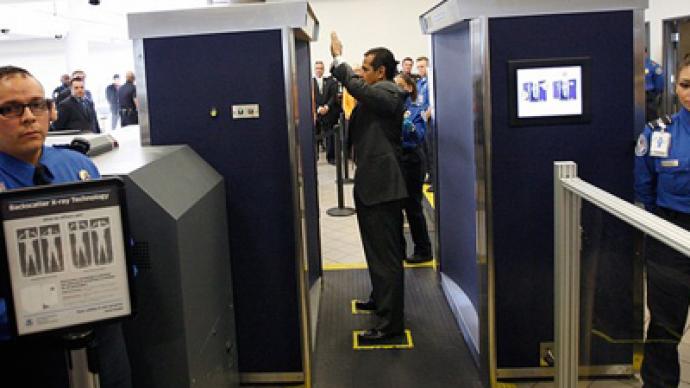New radiation scanners coming to airports

How does $72 million towards a few hundred new radiation-beaming body scanners sound? If you don’t like it, that’s too bad — the US government has already written the check.
Despite being days from default, a new deal between the Transportation Security Administration and Lockheed Martin will allow the defense contractors to receive around $72 million in US funds to install body-scanning devices at airports across the eastern and central United States.According to a press release issued by Lockheed Martin on Thursday, the company will install scanners at around 300 airports, with work in some venues already having started. "Lockheed Martin has partnered with TSA to test, evaluate and install security equipment at US airports since 2009,” writes June Shrewsburg, the company’s VP of Citizen Protection Solutions. “We're honored that TSA chose to continue expanding that partnership.”"Each airport is unique and always in operation, and the threats are constantly evolving. Our goal is to rapidly deploy technologies that ensure both safety and freedom of movement for the flying public,” writes Shrewsburg."Together, we face a challenging mission.”Equally challenging might be the opposition that will come from body-scanner protestors that have rallied against the ongoing installation of the devices since they first began entering American airports. This week’s announcement comes after the first half of 2011 was punctuated by a series of viral videos of dissatisfied passengers lashing out at the TSA for body screenings that feel are unjust, illegal and inappropriate.In addition to repeated cries of privacy violations and unwanted sexual touching carried out by TSA employees, many have fought against the installation of these devices over concerns for health. Last month, Electronic Privacy Information Center Executive (EPIC) Director Marc Rotenberg shined a light on what he calls a “cluster” of cancer cases that were occurring among TSA workers at Boston’s Logan airport. In response, EPIC tried to take on the government, who he says “not been forthcoming with the public about the true extent of radiation risk” associated with the devices.On the other side of the country, scientists at the University of California have petitioned US President Barack Obama that “there is still no rigorous, hard, data for the safety of X-ray airport passenger scanners.” Dr. Michael Love of John Hopkins University school of medicine told AFP last year that, despite the government claiming the risks associated with the scanners are minimal, “statistically someone is going to get skin cancer from these X-rays.”Just over 300 scanners were being used at 65 US airports by the end of last year. Earlier this month Homeland Security said they planned on getting 400 new scanners at a cost of around $300 million.












